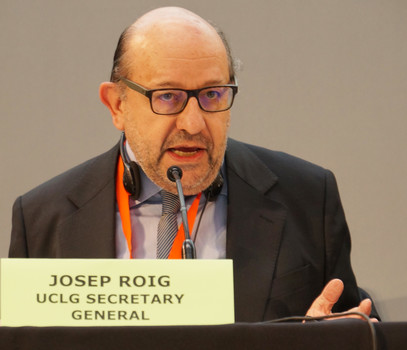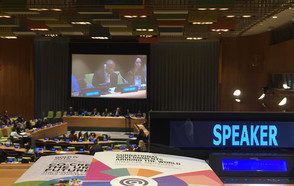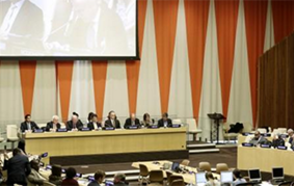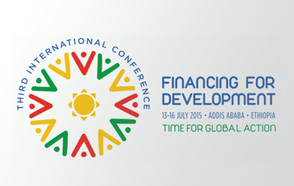
Photo credits: Alejandra Salas/UCLG
Achieving the SDGs depends on action at local and subnational levels. Local and regional governments across the world are ready and willing to play our role. We work hard to ensure that the best services reach the greatest number of people, leaving no one behind; this is what the SDGs are all about.
Local and regional governments have had our say in the definition of the global agendas; we have actively contributed to all the international processes with concrete proposals. We have brought what we have learned from the successes and failures in our own territories, large and small, to the global stage.
We share the excitement and the pride in the ambitious 2030 Agenda, we share the responsibility for the Paris Agreement and we call for the full implementation of the enabling environment of the Habitat III agenda. We all have a lot of work before us. No single sphere of government will be able to do this alone and we, as the closest to the people, will not be able to shy away from our responsibilities when our population asks about access to water, food security, healthy environment, decent housing to live in as well as accountability, equality, greater participation and so on.
In global debates, local and regional governments have pushed for a territorial approach to development, for the recognition of the Right to the City, for the strengthening of local democracy, and for a transversal approach to issues such as climate change and gender equality. We have learned from the positions of civil society, we have developed understanding about the limitations that national governments face. It will be a process of give and take. However, the issue of how to channel resources and financing to where it is needed most remains, unresolved and to a great extent, ignored. Yes, ignored.
There is increasing acceptance of the correlation between local investment and development. Yet, in a context where global savings are abundant and cheap, too little funding reaches the local level. The international agreements and the macro financial policies currently in place fail to address the need to ensure adequate local financing for cities and territories.
Given the negative impact of the global situation at the macroeconomic level and the multiplication of increasingly urban humanitarian crises and urban environmental degradation, this question is more urgent than ever before.
The 2nd Forum on Financing for Development in New York last month went some way to addressing the challenge of financing at local level; we value the increased opportunities given to local authorities to participate in the follow-up of the second ECOSOC Forum on Financing for Development but these are insufficient and reflect the relatively low profile given to subnational governments in this area. 
Our delegation in New York welcomed the Forum Outcome Document, which calls for concrete and immediate action to create an enabling environment for the implementation of Agenda 2030 and the Addis Agenda at all levels of governance. The document is, however, insignificant to tackle the scale of the challenges we face.
We need to tackle the difficult issue of mobilizing sustainable long-term investments, and improve the distribution of resources between the different levels of governance, so that they can actually reach our communities.
It is vital that the international community recognizes the extent to which the quality of financial decentralization affects the investment capacities of local governments. The recent report, "Subnational Governments Around the World: Structure and Finance" conducted by OECD within the Global Observatory on Local Finance of UCLG, indicates that in developed countries, where 30% of national resources are devolved to local and regional governments, they contribute more than 50% of public investment and attract private finances. By contrast, in the least developed countries, where only 8% of national resources are spent at local level, local and regional governments contribute under 7% of public investments. In these countries, however, the small contribution that local governments make to public investment hides the enormous efforts they are making when devoting a significant part of their already scarce resources to investment. By failing to enact financial decentralization, central governments risk amplifying the future costs and burden of local needs, particularly in the context of the financial volumes required for adaptation climate change.
The structural revenues and capacities of local governments must be reinforced to allow us to leverage the mobilization of long-term resources, which is essential to meet urgent investment needs, for example, in transport and transit, one of the priorities identified in the 2nd Global Infrastructure Forum in April 2017. Given the urgent need to invest, we need the international community to promote the establishment of mechanisms of financial guarantee that can reassure banking institutions and private investors. Local and regional governments need enhanced access to tax bases, borrowing, official development assistance and climate finance. In this regard, future Inter-agency Task Force on Financing for Development reports should examine how MDBs, climate finance and official development assistance could play a catalytic role to support local finances in developing countries, particularly in LDCs and low middle-income countries, where cities will expand the most during the next decade.
National governments should consider strategies to strengthen local capacities and diversify local sources of finance. This is a real opportunity to increase the performance of public budgets and to reach a new pool of resources from different sources for urban areas, where wealth is created. In this regard, the experience of local governments on the ground has demonstrated how reforms to local taxation can strengthen the public financial capacities through improved management of local taxes and land value capture, as seen in Maputo (Mozambique), Addis-Ababa (Ethiopia), or in Kampala (Uganda) and Lagos (Nigeria).
The ambitious agendas before us will only be achieved if we ensure a different relationship between government and the people, as well as a different relationship between spheres of government. Lack of capacities and weak systems cannot be a pretext for centralized financing that fails to get resources to those that need them most.
The eradication of poverty, inclusion and equality cannot be seen as abstract concepts within the context of wealth distribution. They need to be seen as rights to be guaranteed and protected by all through shared responsibility.
Local and regional governments have concrete proposals to make financing work from the ground up, not least the creation of a Global Partnership for Localizing Finance and of a Global Think Tank to act as a multi-stakeholder and multilevel umbrella coalitions fostering dedicated programs and funding lines for local and regional governments and communities but also seeking alternative solutions for the challenges we phase.
We will continue gathering knowhow through our Global Observatories and making constructive proposals. Now it’s up to the international community to deepen its structural dialogue with our constituency and give us a relevant role in the international governance architecture alongside the civil society and the private sector, as we called for at the World Assembly of Local and Regional Governments during the Habitat III Conference in Quito.













